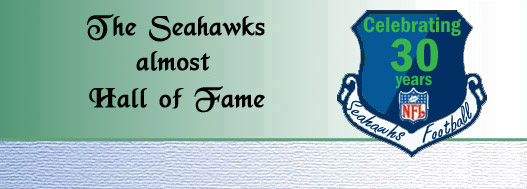  |
          |
Source: Seattle Times
KIRKLAND - In 34 years as an NFL assistant, Tom Catlin has been a no-headliner type of guy. He is more professorial than pyrotechnic, a behind-the-scenes details fanatic. But Catlin couldn't hide last January when Sports Illustrated named him its coach of the year for the 1992 season. The magazine passed over Jimmy Johnson of Dallas, Don Shula of Miami and whiz-kid Bill Cowher of Pittsburgh. Best coach in the NFL for '92? His name is Catlin, said the magazine. It was the first time SI had selected an assistant for the honor. What made it all the more remarkable was that the Seahawks had finished an awful 2-14. The magazine called him "a 61-year-old war horse who got his guys to play like maniacs in a losing cause." The war horse may be headed for the barn. The football clock is winding down for Catlin, who has the lofty title of assistant head coach but goes by the title "adviser." Just what, if anything, he will do for the club next year won't be determined until after the season. This year, his role involves everything from analyzing film, being an extra set of experienced eyes at practice, briefing new players and even suggesting an occasional carrot or onion in the offensive stew. The final decisions, though, are made by Coach Tom Flores and defensive coordinator Rusty Tillman. Catlin said he is enjoying his new role, which doesn't come with the killer 80-hour-plus work weeks of defensive coordinator, the job he held for years. Those are not the kind of hours recommended for anyone who suffered two heart attacks in 1991. The new role also gives him the flexibility to watch practice differently. For decades, he had been preoccupied with linebackers. Now, he wanders more.
When the Seahawks play in Kansas City on Jan. 2, it will be 40 years since Catlin, who had never worn a helmet bar or facemask, was drafted by the Baltimore Colts as a center-linebacker out of Oklahoma. Catlin's football life spans so many years and has involved so many famous players and coaches he gets treated sometimes with the reverence accorded World War I veterans. He can tell stories that bring football legends to life. On the great Paul Brown, his coach as a Cleveland Brown: "He would cut you to pieces with his little sarcastic remarks. . . . You'd be in a meeting watching film and he would say, `76? Who's 76?" "That's me coach, Lou Groza," would come the reply, which Brown of course knew. "Well, Lou, that's about the poorest pass-protection block I've ever seen. Your feet aren't moving and your hands are low." Catlin played for Bud Wilkinson at Oklahoma and played with Jim Brown and Norm Van Brocklin in the NFL. More names? He had to ask the great Col. Red Blaik at Army for permission to leave the West Point plebe staff to resume his pro career and has coached in the NFL with Hank Stram, George Allen, Tommy Prothro, Marv Levy and Chuck Knox. The list of players he has coached includes Merlin Olsen, Deacon Jones and Kenny Easley. Are modern players harder to deal with than those in his early coaching years? "Yes," he replied. Championships? There never was a Super Bowl appearance but Catlin played in three NFL title games for Cleveland in the 1950s, including a 56-10 victory over Detroit in 1954 in what he considers his most memorable triumph. He was on the Dallas Texans' staff when they won the 1962 AFL title.The franchise was moved Kansas City for the next season. At Oklahoma, he was on the 1950 national-championship team. In those days, the title was awarded before bowl games were played. It was a good thing, too, because Kentucky beat the Sooners in the Sugar Bowl. Catlin said his toughest all-time defeat was in the 1974 season, when Minnesota kept the Rams out of the Super Bowl by winning the NFC title 14-10 when a touchdown was called back because of a disputed penalty. Catlin grew up in Ponca City, Okla., the son of an oil-refinery engineer. He accepted a scholarship to the University of Oklahoma after doing well at what amounted to a tryout weekend, which was legal in those days. Prospects wore pads and even scrimmaged as coaches graded them. At Oklahoma, he played linebacker and center and finished 10th in Heisman Trophy balloting. Catlin twice was named an All-America center but his heart as a pro has been on defense. Catlin survived college and pro football without a knee operation. In 1986, he suffered a cracked rib when a defensive back accidentally ran into him on the practice field. An X-ray confirmed the cracked rib but Catlin was surprised when the doctor said, "There's a broken rib here that has healed. Do remember when you broke it?" He couldn't. Catlin never lost a tooth playing football but what he nearly lost in 1991 was his life. He had two heart attacks within a week while on a pre-draft scouting trip. Fortunately for him, the second one occurred while he was still in an Oklahoma City hospital. Minutes after undergoing a test to determine the damage from the first heart attack days earlier, Catlin asked a doctor, "Should I be in pain?" "Where's the pain?' asked the doctor. "Right here," said Catlin, pointing to his chest. "Oh (expletive)," said the doctor. A quadruple bypass operation followed. Catlin was back coaching that fall. Catlin is a 14-handicap golfer who plays at the Sahalee Country Club near his Redmond home. He and his wife, Betty, have two adult children and two grandchildren. More than four decades of football haven't taken the sting out of losses. "You lose a football game and you feel like you've wasted a week of your life," he said.
|



 "I'm seeing drills that have been going on at the other parts of the field for 33 years," he said.
"I'm seeing drills that have been going on at the other parts of the field for 33 years," he said.